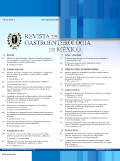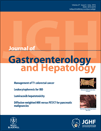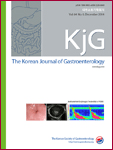
Revista de Gastroenterologia de Mexico
Scope & Guideline
Unlocking the Secrets of Gastrointestinal Health
Introduction
Aims and Scopes
- Clinical Research in Gastroenterology and Hepatology:
The journal prioritizes original research articles that provide insights into the clinical management of gastrointestinal and liver diseases, including studies on disease prevalence, treatment efficacy, and novel therapeutic approaches. - Endoscopic Techniques and Innovations:
A significant focus on the development and application of endoscopic procedures, including new technologies and methods for diagnosing and treating gastrointestinal disorders. - Multidisciplinary Approaches to Gastrointestinal Disorders:
Encouragement of collaborative research that integrates various specialties, such as surgery, oncology, and infectious diseases, to enhance patient outcomes in gastrointestinal health. - Public Health and Epidemiology in Gastroenterology:
Research addressing the epidemiological trends and public health challenges related to gastrointestinal diseases in Latin America, including studies on risk factors and healthcare access. - Education and Guidelines in Gastroenterology:
The journal also emphasizes the dissemination of consensus statements and clinical guidelines aimed at improving practice standards among healthcare professionals in the region.
Trending and Emerging
- Liver Disease Management and Transplantation:
A notable increase in publications related to liver disease, particularly advancements in liver transplantation techniques and post-transplant management, indicative of the growing importance of hepatology. - Inflammatory Bowel Disease (IBD) Research:
There is a rising trend in studies focusing on IBD, including Crohn's disease and ulcerative colitis, highlighting new therapeutic strategies and the impact of biologic treatments. - Impact of COVID-19 on Gastroenterology:
Emerging research exploring the effects of COVID-19 on gastrointestinal health and the management of gastroenterological conditions, reflecting the ongoing global pandemic's influence on patient care. - Technological Advances in Endoscopy:
Innovations in endoscopic techniques, including the use of artificial intelligence and advanced imaging technologies, are increasingly featured, showcasing the journal's commitment to cutting-edge research. - Nutritional Gastroenterology:
Growing attention to the role of nutrition in gastrointestinal health, including studies on dietary interventions and their effects on various gastrointestinal disorders.
Declining or Waning
- Traditional Surgical Techniques:
There appears to be a waning emphasis on traditional surgical approaches, such as open surgeries for common gastrointestinal conditions, as minimally invasive techniques gain prominence. - Descriptive Epidemiological Studies:
Research that primarily focuses on descriptive epidemiology without targeting specific interventions or outcomes has decreased, possibly due to a shift towards more targeted, intervention-oriented studies. - Pediatric Gastroenterology:
There has been a reduction in pediatric-focused research, particularly in areas unrelated to inflammatory bowel disease, as adult gastroenterology topics gain more attention in the journal.
Similar Journals

Turkish Journal of Gastroenterology
Fostering Excellence in Gastroenterological ResearchTurkish Journal of Gastroenterology is a distinguished publication in the field of gastroenterology, published by AVES in Turkey. With its Open Access format since 2022, the journal facilitates expansive dissemination of research findings, catering to an audience of researchers, healthcare professionals, and students eager to stay abreast of the latest advancements in the field. The journal has maintained a reputable standing with an impressive Q3 category ranking in Gastroenterology as of 2023, recognizing its contributions to expanding knowledge and fostering innovation in gastrointestinal health. Spanning from 1996 to 2024, the Turkish Journal of Gastroenterology commits to publishing high-quality, peer-reviewed articles that engage and inform its audience while addressing key challenges and breakthroughs in the field. The journal's presence in Scopus and its rank of #108 out of 167 in Medicine Gastroenterology further underscore its relevance and increasing impact within the academic community.

BMC GASTROENTEROLOGY
Advancing Gastrointestinal Health Through Open Access ResearchBMC Gastroenterology is a premier open-access journal published by BMC, dedicated to disseminating high-quality research in the field of gastroenterology. Established in 2001 and headquartered in the United Kingdom, this journal aims to enhance the understanding of gastrointestinal disorders through innovative research, reviews, and clinical studies. With an impressive impact factor and ranking within the Q2 category in gastroenterology and miscellaneous medicine for 2023, BMC Gastroenterology plays a critical role in advancing knowledge and practices in the field. The journal's commitment to open access ensures that researchers, professionals, and students worldwide can freely access and share vital findings and insights. Encouraging collaboration and knowledge transfer, BMC Gastroenterology is an essential resource for those dedicated to improving gastrointestinal health and outcomes.

JOURNAL OF GASTROENTEROLOGY
Leading the way in gastroenterology research excellence.JOURNAL OF GASTROENTEROLOGY, published by SPRINGER JAPAN KK, is a premier academic journal that has been at the forefront of gastrointestinal research since its inception in 1994. With an impressive Impact Factor and ranking in the top quartile (Q1) of its category, this journal holds a significant place in the field of gastroenterology, currently ranked 12th out of 167 in Scopus, placing it in the 93rd percentile. The journal serves as an essential platform for disseminating innovative research, clinical studies, and reviews that foster advancements in the understanding and treatment of gastrointestinal diseases. Although it does not offer Open Access options, it provides researchers, clinicians, and students access to crucial insights and breakthroughs pivotal to improving patient care and outcomes in gastroenterology. With a commitment to high-quality peer-reviewed content, JOURNAL OF GASTROENTEROLOGY plays a vital role in shaping the future of gastrointestinal health and research.

ACTA GASTRO-ENTEROLOGICA BELGICA
Advancing Gastroenterology through ExcellenceACTA GASTRO-ENTEROLOGICA BELGICA is a prestigious journal dedicated to advancing the field of gastroenterology through the dissemination of high-quality research and clinical insights. Published by UNIVERSITE CATHOLIQUE DE LOUVAIN (UCL), this journal is an essential resource for researchers, healthcare professionals, and students alike, focusing on a wide range of topics including gastrointestinal diseases, treatments, and innovations in clinical practices. While the journal operates under a traditional access model, its impact in the academic community is significant, ensuring that vital research is communicated effectively to stakeholders in Belgium and beyond. With its commitment to academic excellence, ACTA GASTRO-ENTEROLOGICA BELGICA plays a crucial role in fostering high-level discourse and collaboration among experts in the field, ultimately encouraging advancements that improve patient care and outcomes.

EUROPEAN JOURNAL OF GASTROENTEROLOGY & HEPATOLOGY
Advancing knowledge in digestive health.The EUROPEAN JOURNAL OF GASTROENTEROLOGY & HEPATOLOGY, published by LIPPINCOTT WILLIAMS & WILKINS, serves as a key platform for disseminating cutting-edge research in the fields of gastroenterology and hepatology since its inception in 1989. With its ISSN 0954-691X and E-ISSN 1473-5687, the journal has established a prominent reputation, as reflected in its 2023 rankings, placing it in Q2 for Gastroenterology and Q3 for Hepatology. It is ranked #75 out of 167 in gastroenterology and #39 out of 82 in hepatology according to Scopus, highlighting its importance in advancing knowledge and clinical practices. While it does not currently offer open access options, the journal remains essential for researchers, healthcare professionals, and students seeking to stay abreast of significant developments and innovations in digestive health. By providing rigorous peer-reviewed articles, the EUROPEAN JOURNAL OF GASTROENTEROLOGY & HEPATOLOGY continues to contribute to the understanding and treatment of gastrointestinal and liver diseases, making it a vital resource in the medical community.

World Journal of Gastrointestinal Endoscopy
Transforming Insights into Clinical PracticesWorld Journal of Gastrointestinal Endoscopy, an esteemed publication under the BAISHIDENG PUBLISHING GROUP INC, plays a pivotal role in advancing the field of gastroenterology through its dedicated focus on cutting-edge research and innovative practices in gastrointestinal endoscopy. With a commitment to facilitating the dissemination of knowledge, this journal seeks to provide a platform for researchers, clinicians, and academic professionals to share their findings and insights into the latest endoscopic techniques, technologies, and applications. The journal aims to foster collaboration and improve patient outcomes through rigorous peer-reviewed articles that encompass a broad range of topics within gastrointestinal endoscopy. With its impact on shaping clinical practices and influencing future research directions, the World Journal of Gastrointestinal Endoscopy is an essential resource for anyone in the field, remaining accessible through various academic channels, including institutional libraries and individual subscriptions.

JOURNAL OF GASTROENTEROLOGY AND HEPATOLOGY
Driving excellence in gastrointestinal and liver disease studies.Welcome to the JOURNAL OF GASTROENTEROLOGY AND HEPATOLOGY, an esteemed publication in the field of gastroenterology and hepatology, proudly published by WILEY. Established in 1986, this journal serves as a crucial platform for researchers, healthcare professionals, and students, presenting groundbreaking research and comprehensive reviews that drive advances in understanding and treating gastrointestinal and liver diseases. With a strong reputation evidenced by its Q1 ranking in gastroenterology and Q2 ranking in hepatology, this journal ranks impressively in the Scopus metrics - positioned at #22 out of 167 in gastroenterology and #21 out of 82 in hepatology, reflecting its contribution to scholarly excellence. Although it does not offer open access options, the journal’s rich archive and diverse topics make it indispensable for those dedicated to improving patient outcomes in these critical areas of medicine. Whether you are a seasoned researcher or an aspiring medical professional, engaging with this journal will keep you at the forefront of the latest developments and emerging trends in gastroenterology and hepatology research.

Korean Journal of Gastroenterology
Empowering Clinicians with Cutting-Edge InsightsKorean Journal of Gastroenterology (ISSN: 1598-9992, E-ISSN: 2233-6869), published by the Korean Society of Gastroenterology, has been a premier outlet for research and advancements in the field of gastroenterology since its inception in 1968. This open-access journal, based in South Korea, fosters a global dialogue on gastrointestinal health, embracing contributions from a diverse array of disciplines within medicine. It is currently ranked in the Q4 quartile for miscellaneous medicine and holds a Scopus rank of #323 out of 636 in general medicine, reflecting its commitment to publishing impactful research despite its relatively recent establishment in high-impact metrics. With a continuous publication timeline extending through to 2024, the journal aims to enhance understanding of gastrointestinal disorders and promote innovative treatments, making it an essential resource for researchers, clinicians, and students alike who seek to stay abreast of the latest developments and clinical applications in gastroenterology.

Gut and Liver
Exploring breakthroughs in gastrointestinal and liver diseases.Gut and Liver is a prestigious peer-reviewed journal dedicated to advancing the fields of Gastroenterology and Hepatology. Published by the EDITORIAL OFFICE GUT & LIVER in South Korea, this Open Access journal has been disseminating valuable research findings since 2007, making critical knowledge accessible to a global audience. With an impressive 2023 impact factor that places it in Q1 rank in both Gastroenterology (#28/167) and Hepatology (#22/82), it is recognized as a leader in the medical domain. The journal covers diverse topics, including innovative therapeutic strategies, clinical practices, and groundbreaking research in liver diseases and gastrointestinal disorders, thereby playing a vital role in improving patient care and outcomes. Researchers, healthcare professionals, and students can benefit from the journal's wealth of information, designed to foster collaboration and spark new ideas within the scientific community. For further engagement with current research, readers can access issues from 2009 to 2024 and stay updated on the latest advancements in the field.

AMERICAN JOURNAL OF GASTROENTEROLOGY
Unveiling Insights: The Heart of Gastrointestinal Research.AMERICAN JOURNAL OF GASTROENTEROLOGY, published by Lippincott Williams & Wilkins, stands as a premier journal in the field of gastroenterology and hepatology, boasting a notable impact factor that underscores its influence in the medical community. With an ISSN of 0002-9270 and an E-ISSN of 1572-0241, this journal has a long-standing tradition since its inception in 1938, officially recognized from the year 1947 to 2024. It holds esteemed positions in Q1 quartiles for both gastroenterology and hepatology as of 2023, reflecting its high-quality research output and its crucial role in advancing medical knowledge. Ranked 13th out of 167 in the field of Gastroenterology and 13th out of 82 in Hepatology by Scopus, it serves as an essential resource for researchers, professionals, and students alike, fostering an environment for the dissemination of groundbreaking studies and insights in gastrointestinal health. Its comprehensive focus on clinical and translational aspects aims to illuminate the complexities of digestive diseases, promising to contribute significantly to advancements in patient care and treatment methodologies.